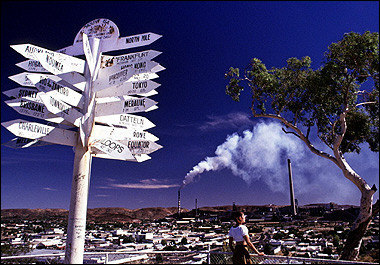|
Australia to host Asia-Pacific climate meeting next month
(AFP)
Updated: 2005-12-08 09:36
Australia next month will host the maiden meeting of a six-nation
Asia-Pacific "partnership" against climate change, Australian Environment
Minister Ian Campbell announced.
The inaugural meeting will take place in Sydney at ministerial level,
Campbell said at the United Nations climate talks in Montreal. He did not give
the date.
The initiative -- formally called the Asia-Pacific Partnership on Clean
Development and Climate -- was launched in Bangkok in July, and it was left to a
later meeting to flesh out details.
It gathers the United States, China, India, Japan, South Korea and Australia.
"This critical partnership will work practically and collaboratively to
accelerate development and deployment of clean and low-emissions technologies
and share best practices on clean development and climate," Campbell said.

Outback mining town of Mount Isa which is the
single most polluting source of greenhouse gases in Australia.
[AFP/file] | At a press conference in Montreal, US Under Secretary of State for Democracy and
Global Affairs Paula Dobriansky said Secretary of State Condoleezza Rice would
attend the meeting, and the US delegation would include business
representatives.
"There are a number of very specific projects" that would be discussed at the
meeting, she said, itemising energy security, poverty reduction and sustainable
development.
Green groups are suspicious of the initiative, seeing in it as a US attempt
to subvert the Kyoto Protocol on greenhouse gases, the UN pact abandoned by
Washington in 2001 as being too costly for its economy.
That suggestion is denied by the partnership members, who say the scheme
seeks to encourage the introduction of cleaner energy sources among fast-growing
developing countries.
On Wednesday, British Environment Secretary Margaret Beckett, whose country
is current president of the European Union (EU), told journalists, "The
Asia-Pacific partnership sounds like a worthwhile initiative."
David Garman, an under secretary at the US Department of Energy, said, "It's
very important for nations such as India and China to get started on the
technological pathway."
China is now the second biggest greenhouse-gas polluter after the United
States thanks to the voracious rise in coal, gas and oil consumption to power
its economic growth.
Fossil fuels are the backbone of energy sources today, but burning them
releases invisible gases that trap the Sun's heat in the Earth's atmosphere
rather than let it bounce back into space.
As a result, the planet's temperature has risen sharply in the past three
decades, setting it on course for what scientists say is potentially ruinous
damage to the climate system.
Australia and the United States signed the framework deal for the Kyoto
Protocol in 1997.
In 2001, as negotiations for completing Kyoto's rulebook were still underway,
the US said it would not ratify the outcome and Australia followed suit.
The main US objection is to Kyoto's approach for legal caps on industrialised
signatories to reduce emissions as compared to a 1990 benchmark. This cap,
according to the administration of President George W. Bush, is too costly for
the US economy.
Facing withering criticism for walking away from a treaty that it was
instrumental in crafting, the United States has been fighting back with
partnerships that promote a voluntary, technology-driven approach to reducing
pollution.
|